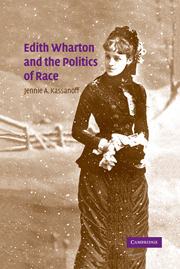Book contents
- Frontmatter
- Contents
- Acknowledgements
- Introduction
- 1 Invaders and Aborigines: playing Indian in the Land of Letters
- 2 “The real Lily Bart”: staging race in The House of Mirth
- 3 “A close corporation”: the body and the machine in The Fruit of the Tree
- 4 The Age of Experience: pragmatism, the Titanic and The Reef
- 5 Charity begins at home: Summer and the erotic tourist
- 6 Coda: The Age of Innocence and the Cesnola controversy
- Notes
- Bibliography
- Index
5 - Charity begins at home: Summer and the erotic tourist
Published online by Cambridge University Press: 22 September 2009
- Frontmatter
- Contents
- Acknowledgements
- Introduction
- 1 Invaders and Aborigines: playing Indian in the Land of Letters
- 2 “The real Lily Bart”: staging race in The House of Mirth
- 3 “A close corporation”: the body and the machine in The Fruit of the Tree
- 4 The Age of Experience: pragmatism, the Titanic and The Reef
- 5 Charity begins at home: Summer and the erotic tourist
- 6 Coda: The Age of Innocence and the Cesnola controversy
- Notes
- Bibliography
- Index
Summary
Edith Wharton recalled writing Summer “amid a thousand interruptions and while the rest of my being was steeped in the tragic realities of the war” (Backward Glance 356). Yet the story of a backwoods New England woman forced to marry her own step-father after becoming pregnant by a visiting New York architect seems, if anything, a regionalist escape from what Wharton called the “awful ordeal of our race” (letter to Sara Norton, Oct. 15, 1918). The “vision” of a “shortish novel,” “about a New England village, rather on the lines of Ethan Frome, but taking place at the height of the hot New England summer,” had come to Wharton suddenly in the summer of 1916; by mid-August, she was “putting [it] down as quickly as possible” (Letters 385; letter to Charles Scribner, August 16, 1916). She completed the manuscript “known to its author & her familiars as the Hot Ethan” by early 1917 (Letters 385). “I don't know how on earth the thing got itself written in the scramble & scuffle of my present life,” Wharton told her friend Gaillard Lapsley, “but it did” (Letters 385).
Despite its isolated setting in the remote hill country of western Massachusetts, Summer draws its force from a range of international and domestic concerns that together inform its deeply conservative message. This chapter proposes to account for these diverse cultural sources and their cumulative effect.
- Type
- Chapter
- Information
- Edith Wharton and the Politics of Race , pp. 112 - 152Publisher: Cambridge University PressPrint publication year: 2004



